
Journal of Southeast Asian Economies
Scope & Guideline
Empowering Scholars to Shape Southeast Asia's Economic Narrative
Introduction
Aims and Scopes
- Economic Policy and Governance:
Research exploring the effectiveness of economic policies, governance structures, and institutional frameworks across Southeast Asian nations. - Trade and Investment Dynamics:
Analysis of trade agreements, foreign direct investment, and their impacts on regional economic integration and development. - Labor Markets and Employment:
Studies on labor market trends, wage dynamics, and the effects of migration on employment patterns in Southeast Asia. - Digital Transformation and Innovation:
Investigations into the role of digital technologies in transforming economies, with a focus on the implications for productivity and growth. - Agricultural Economics and Food Security:
Research addressing agricultural productivity, food security, and the socio-economic impacts of agricultural policies. - Climate Change and Resilience:
Exploration of economic resilience in the face of climate change, including adaptation strategies and their economic implications. - Education and Human Capital Development:
Studies on the quality of education, human capital development, and their influence on economic outcomes in the region.
Trending and Emerging
- Impact of COVID-19 on Economies and Labor Markets:
Research examining the ramifications of the COVID-19 pandemic on labor markets, economic resilience, and recovery strategies has surged, indicating a critical need for insights into post-pandemic economic dynamics. - Digital Economy and Transformation Strategies:
There is an increasing focus on digital transformation, with studies exploring policies, strategies, and outcomes related to the digital economy, highlighting its importance for future growth. - Sustainable Development and Climate Resilience:
Emerging research themes are focusing on sustainability and climate resilience, addressing how economies can adapt to climate change while ensuring growth and development. - Regional Economic Integration and Trade Agreements:
The analysis of regional trade agreements, particularly within ASEAN, is gaining traction as countries navigate new economic partnerships and integration efforts. - Gender and Labor Market Dynamics:
An increasing number of studies are addressing gendered impacts in labor markets, particularly in the context of economic recovery and resilience strategies post-COVID-19.
Declining or Waning
- Resource Curse and Economic Diversification:
Research on the resource curse and diversification strategies, while still relevant, has become less frequent as countries seek to develop more sustainable economic practices. - Traditional Industrial Policies:
The emphasis on traditional industrial policies has waned as the focus shifts toward innovation, digital transformation, and the implications of globalization. - Macroeconomic Stability Analysis:
Studies focusing solely on macroeconomic stability indicators have decreased, possibly reflecting a broader interest in more nuanced analyses that incorporate social and environmental factors. - Regional Disparities in Development:
Although still important, the specific emphasis on regional disparities within Southeast Asian economies has been less prominent, as contemporary research increasingly focuses on integrated regional development. - Conventional Educational Models:
Research on conventional educational models is declining, as there is a growing interest in innovative approaches to education that leverage technology and address contemporary challenges.
Similar Journals

Journal of Economics Finance and Administrative Science
Advancing global insights in economics and finance.Journal of Economics Finance and Administrative Science, published by Emerald Group Publishing Ltd, is a premier open-access journal that has been at the forefront of advancing knowledge since its inception in 2012. With an ISSN of 2077-1886 and E-ISSN of 2218-0648, the journal caters to the disciplines of economics, finance, and administrative sciences within an international context, specifically observing trends from Peru and beyond. This highly regarded journal holds a Q1 ranking in Economics, Econometrics and Finance for 2023, landing it in the top percentile among its peers, with an impressive Scopus rank of #33 out of 288 in general economics. Since transitioning to open access in 2017, the journal has democratized access to cutting-edge research, making it indispensable for researchers, professionals, and students alike. By publishing rigorous empirical studies, comprehensive reviews, and innovative theoretical contributions, the Journal of Economics Finance and Administrative Science aims to facilitate knowledge exchange and foster collaboration within the global academic community.
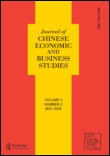
Journal of Chinese Economic and Business Studies
Exploring the Dynamics of China's Economic LandscapeJournal of Chinese Economic and Business Studies, published by Routledge Journals, Taylor & Francis Ltd, serves as a vital platform for the exploration and dissemination of research focused on the dynamic landscape of China’s economy and business practices. With a keen emphasis on innovative economic theories and empirical studies, this journal aims to bridge gaps between academia and industry by publishing high-quality articles that address contemporary issues and trends affecting China's economic environment. The journal holds a commendable Q2 ranking in the field of Economics, Econometrics, and Finance as of 2023, and it ranks 45th out of 288 journals in the general category, placing it in the 84th percentile, a testament to its rigorous academic standards and impact within the field. Although it does not offer open access, the journal is dedicated to contributing significantly to scholarly discourse, making it an essential resource for researchers, professionals, and students aiming to deepen their understanding of the complexities of Chinese economic and business dynamics, particularly from 2010 to 2024.
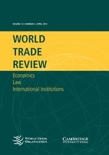
World Trade Review
Advancing Knowledge in International Economics and LawWorld Trade Review is a prestigious academic journal published by Cambridge University Press, focusing on the intricate dynamics of international trade, economics, law, and political science. With its ISSN 1474-7456 and E-ISSN 1475-3138, this journal has been a cornerstone of scholarly communication since its inception in 2002 and is poised to continue contributing to its field until 2024. Notably, it holds a Q3 ranking in Economics and Econometrics, and Q2 in both Law and Political Science and International Relations, emphasizing its critical role in advancing knowledge across these disciplines. Additionally, the journal enjoys commendable Scopus rankings, with a 79th percentile in Law and a 71st percentile in Political Science, affirming its relevance and impact in academic research. Although not currently an open-access publication, it remains a vital resource for researchers, professionals, and students eager to explore and contribute to the evolving landscape of global trade and its multifaceted implications.
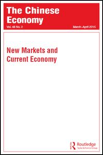
CHINESE ECONOMY
Unraveling Economic Strategies in the Heart of ChinaCHINESE ECONOMY is a prominent journal dedicated to the exploration of China’s economic landscape and its global implications. Published by Routledge Journals, Taylor & Francis Ltd, this esteemed journal publishes original research and critical reviews that advance our understanding of economic dynamics, policies, and behaviors in China. With an ISSN of 1097-1475 and an E-ISSN of 1558-0954, it boasts a significant impact in the field, holding a Q2 ranking in the 2023 category of Economics, Econometrics, and Finance. This journal is a key resource for researchers, professionals, and students seeking in-depth analyses and comprehensive insights, reflecting its esteemed position within the 82nd percentile of Scopus rankings for general economics. With a broad scope covering substantial economic issues from 2008 through 2024, CHINESE ECONOMY is essential for understanding the evolving economic strategies and challenges faced by China within a global context.

INTERNATIONAL ECONOMICS AND ECONOMIC POLICY
Connecting Theory and Practice in International EconomicsINTERNATIONAL ECONOMICS AND ECONOMIC POLICY, published by Springer Heidelberg, is a pivotal journal in the field of economics, focusing on both theoretical and empirical research that addresses pressing international economic issues. With an ISSN of 1612-4804 and an E-ISSN of 1612-4812, this journal has been a reliable source of insights since its inception and is poised for continuous growth, converging its themes from 2005 to 2024. Ranked in the Q2 category of Economics and Econometrics in 2023, it stands at a commendable 63rd percentile among similar journals, emphasizing its significance and impact in the academic community. Located in Heidelberg, Germany, the journal provides an access portal for researchers, professionals, and students to engage with cutting-edge economic analyses that inform policy and practice globally. By publishing original articles, reviews, and policy discussions, INTERNATIONAL ECONOMICS AND ECONOMIC POLICY plays a crucial role in shaping the discourse within the global economics landscape.
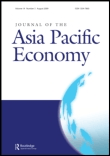
Journal of the Asia Pacific Economy
Navigating the Complexities of the Asia Pacific EconomyThe Journal of the Asia Pacific Economy is a leading academic journal dedicated to exploring economic, political, and social developments across the Asia Pacific region. Published by Routledge Journals, Taylor & Francis Ltd, this journal has been a pivotal platform for scholarly communication since its inception in 1996, contributing to a deeper understanding of regional dynamics through a rigorous peer-review process. With an impressive positioning in the Q2 category across multiple disciplines, including Development, Geography, Planning and Development, and Political Science and International Relations, the journal excels in disseminating high-quality research that influences policy and academic discourse. Researchers and professionals alike benefit from its accessibility and scholarly relevance, drawing from diverse methodologies and theoretical frameworks to address pressing issues of the Asia Pacific economy. As it continues to publish until 2024, the journal remains dedicated to advancing knowledge and fostering collaboration within the academic community.
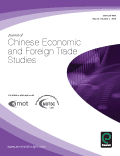
Journal of Chinese Economic and Foreign Trade Studies
Unraveling the Intricacies of Trade and PolicyJournal of Chinese Economic and Foreign Trade Studies is a distinguished academic platform dedicated to exploring the intricate dynamics of China’s economic policies and foreign trade practices. Published by Emerald Group Publishing Ltd, this journal caters to a diverse readership interested in the intersection of business, economics, and international management. With an ISSN of 1754-4408 and an E-ISSN of 1754-4416, it demonstrates its influence in the scholarly community, evidenced by its latest categorization as a Q3 journal in Business and International Management and Q2 in Economics, Econometrics, and Finance for 2023. The journal’s rank of #67/288 in the Scopus database places it in the 76th percentile, affirming its significance in the field. Although it operates under traditional access models, the journal invites rigorous academic discourse and provides a vital source of knowledge for scholars interested in the evolving landscape of Chinese trade and economic strategies from 2010 to 2024.

China Economic Quarterly International
Illuminating Contemporary Challenges in China and BeyondWelcome to China Economic Quarterly International, a leading peer-reviewed journal published by KEAI PUBLISHING LTD, dedicated to advancing the study of economic, sociological, and geographical issues pertinent to China and beyond. Since its transition to Open Access in 2021, the journal has significantly increased its accessibility, encouraging wider dissemination and engagement within the academic community. With impressive rankings in the 2023 Scopus Categories, including a prestigious Q1 designation in multiple fields such as Economics, Sociology, and Geography, the journal provides a comprehensive platform for innovative research and interdisciplinary dialogue. Its timely issues cover contemporary challenges and developmental trends, making it invaluable for researchers, professionals, and students who seek to deepen their understanding of the dynamic economic landscape. As the journal continuously aims to foster academic collaboration and stimulate critical discussions, it stands out as a pivotal resource for insights into China's evolving socio-economic framework.
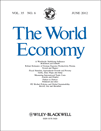
WORLD ECONOMY
Empowering scholars and practitioners with impactful research.WORLD ECONOMY is a premier academic journal published by Wiley, renowned for its rigorous peer-reviewed research in the fields of economics, finance, accounting, and political science. Established in 1977, the journal has consistently contributed to the advancement of knowledge, reflected in its strong standing across various category quartiles, notably achieving Q1 in Accounting and Political Science, and ranking in the top quartile in its respective disciplines as of 2023. With an audience that spans researchers, professionals, and students, WORLD ECONOMY publishes impactful articles that explore critical issues affecting the global economy. Although it is not an open-access publication, readers have access options to engage with cutting-edge research that addresses both theoretical and practical aspects of world economic trends. The journal's commitment to excellence is further underscored by its impressive Scopus rankings, situating it among the top journals in the social sciences arena. For anyone keen on deepening their understanding of the dynamics shaping our economic landscape, WORLD ECONOMY remains an indispensable resource.

Equilibrium-Quarterly Journal of Economics and Economic Policy
Fostering Innovative Research in Economics and PolicyEquilibrium-Quarterly Journal of Economics and Economic Policy is a leading open-access journal, published by the Institute of Economic Research in Poland. Since its inception in 2011, this journal has served as a vital platform for disseminating innovative research and scholarly discourse in Economics and Economic Policy. The journal maintains a high impact within the academic community, currently holding a Q2 ranking in Economics and Econometrics and a Q1 ranking in the miscellaneous category of Economics, Econometrics, and Finance as of 2023. With an impressive Scopus ranking, it sits at #8 out of 242 in its field, demonstrating its commitment to quality and relevance in contemporary economic research. The journal welcomes contributions that advance theoretical and empirical discussions, encompassing a broad spectrum of topics in economics, thereby appealing to researchers, professionals, and students alike. Through its open access model, Equilibrium ensures widespread availability of knowledge and fosters collaboration across disciplines within the global economic community.